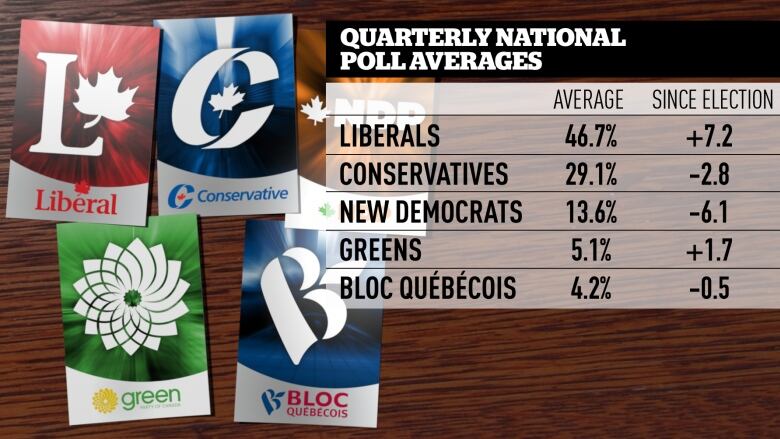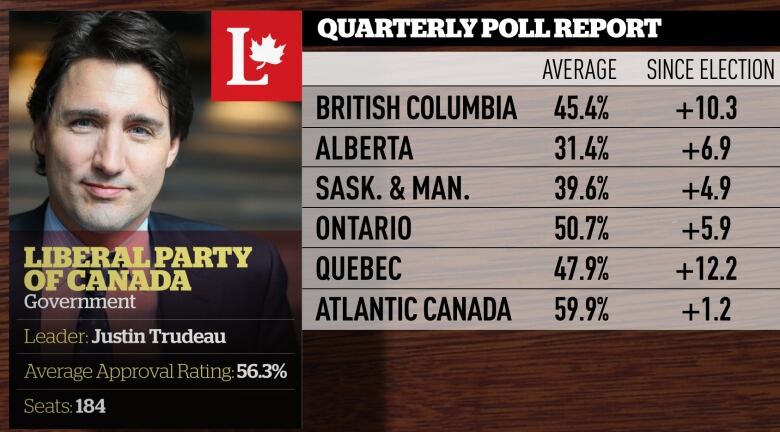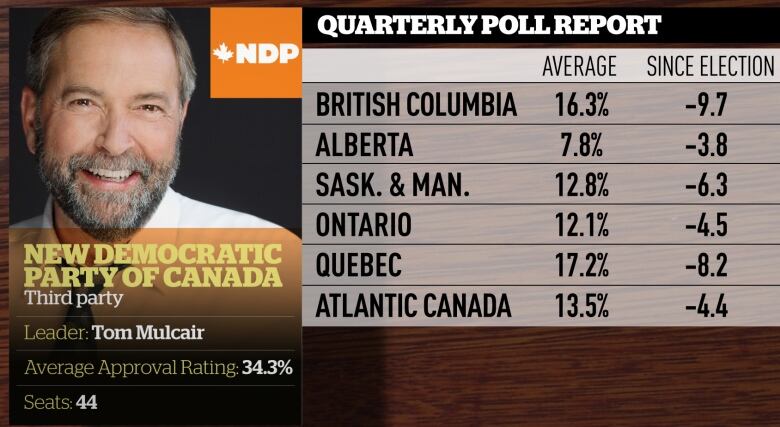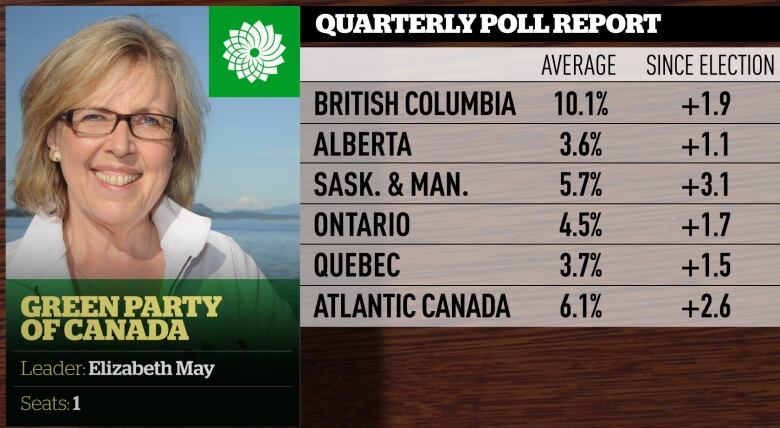Justin Trudeau's Liberals hold support from post-election honeymoon
Latest quarterly report shows Liberals holding steady, well above their electoral support

Honeymoons don't last forever. But that doesn't mean the love affair has to end and thelove affair Canadians are having with Justin Trudeau's Liberals appears to be enduring in the polls.
The Liberals continue to hold the new support they captured after their majority victory in last fall's federal election, when they pulledvotesaway from both the Conservatives and New Democrats.
- What do Canadians think of the leaders? Explore the latest numbers for the 5 major federal leadersin our new CBC Leader Meter.
JustinTrudeau'sown popularity also remains high, with approval ratings well above those of both of his main rivals,interim Conservative LeaderRonaAmbrose and outgoing NDP Leader TomMulcair, as well asthe ratings he posted before last year's vote.
TheCBC'snew interactive tool, the Leader Meter, lets you track those numbers.
Over the last three months of polling,the Liberals have averaged 46.7 per cent support. That'san increase of 7.2 points over their performance in the Oct. 19 election and nearly even (up 0.1 points) from their average support duringthe previous quarter of federal polling calculated three months ago.
The Conservatives have averaged 29.1 per cent, also unchanged from where they were in the previous quarter but down 2.8 points from the last election.
The New Democrats, after taking 19.7 per cent of the vote last fall, haveaveraged just 13.6 per cent support. That's down 6.1 points from the last election and one point from the previous quarter.
The Greens have averaged 5.1 per cent support since March, while the Bloc Qubcois has averaged 4.2 per cent.
The Liberals' support has held relatively steady across the board notable considering that their polling numbers between December 2015 and February 2016 had all the hallmarks of the normal political honeymoon of a new government.
But the party has nevertheless seen further gains in some parts of the country, particularly in British Columbia. The party is up 10.3 points from the last election, leading in the province with 45.4 per cent support, and has gained 2.6 points over the last quarter alone.
The Liberals' most significant increase since the last electionremains in Quebec, where the party has gained12.2 points since the last election and sits at47.9 per cent. That level of support is largely unchangedfrom where they were in the previous quarter.
- Canadians shrug off Trudeau's elbow, polls suggest
- The Pollcast: Sign up for ric Grenier'spoliticspodcast
In Ontario and the Prairies, the Liberals have also posted gains since both the election and the last quarter. They lead comfortably in Ontariowith 50.7 per cent support and trail the Conservatives narrowly in Saskatchewan and Manitoba with 39.6 per cent.
But the Liberals may have reached a ceiling in Atlantic Canada. With 59.9 per cent support, the party is only up slightly over the 2015 election result that saw them sweep the region, and they are down 3.5 points from last quarter.
Trudeau, too, may have hit a ceiling. His average approval rating over the last three months (56.3 per cent) is down over three points from last quarter.
Perhaps the first hints that the love affair mayone day sour.
Though the Conservatives are still polling below their standing last fall, they have nevertheless managed to hold on to the support they posted in the initial aftermath of losing power.
Since the election, the party's biggest losses have occurred in Alberta (down 4.5 points to 55.1 per cent) and in Ontario and Quebec, where the party is down 3.4 points. That puts them at 31.7 per cent in Ontario and 13.3 per cent in Quebec.
Despite the praise Stephen Harper had in his speech to the party's convention last week for the Conservatives' electoral gains in Quebec, that is one province where the party saw its support decrease for a second consecutive quarter.
But the Conservatives did see an increase over the last quarter in the province where they held that convention the Tories were up about two points in British Columbia, to 27.2 per cent, though that is still down almost three points from the last election.
This most recentquarter was a difficult one for the New Democrats. Their provincial cousins lost elections in Saskatchewan and Manitoba, the latter ending almost 17 years in office, and their federal leader lost a key leadership vote and will be replaced next year.
Perhaps unsurprisingly, this coincided with a drop in Tom Mulcair's approval ratings. Hisaverageapproval rating was down more than eight points from the previous quarter, to 34.3 per cent.
The party continues to poll well below its results from the last election, down more than six points on the Prairies, eight points in Quebec and almost 10 points in British Columbia. That is where the NDP saw its biggest drop in support over the last three months as well, falling 3.9 points to 16.3 per cent.
B.C. will be holding a provincial election in less than a year that the provincial NDP is hoping to win.
The Bloc Qubcois averaged 16.8 per cent support in Quebec over the last three months. That is a drop of2.6 points from the last election the party's worst but up 2.2 points from last quarter.
The Greens saw no significant shift in support over the last three months. The party's best results came in British Columbia, where the Greens averaged 10.1 per cent. That was down marginallyover the last three months, but up about two points since the last election. Everywhere else, the Greens, who traditionally poll above their electoral results, averaged less than 7per cent support.
Leader Meter: CBC Politics' new interactive tool
The next federal election may be years away, but what Canadians think of how their political leaders are doing today matters and the CBC'sLeader Metertracks just that.
The Leader Meter is an interactive feature tracking the latest public opinion polls related to leaders' approval and disapproval ratings. The Leader Meter lets you choose the data you want to look at, how you want to break it down, and how it compares to past party leaders and Canadian prime ministers.
Youcan check out the Leader Meter here. You can also read afull explanation on how to get the most out of this interactive tool here.
Follow CBCPolitics on Twitter @cbcpolitics
This article reviews trends in national public opinion surveys, and includes all polls conducted andpublished by different pollsters between March 1 and June 1, 2016.Methodology, sample size and margin of error if one can be stated vary from survey to survey and have not been individually verified.
Clarifications
- This story has been updated from an earlier version that stated "Nowhere else did the Greens, who traditionally poll above their electoral results, average more than 6 per cent support." In fact, the Greens averaged 6.1 per cent in Atlantic Canada.Jun 01, 2016 11:15 AM ET

















_(720p).jpg)


 OFFICIAL HD MUSIC VIDEO.jpg)
.jpg)



























































































